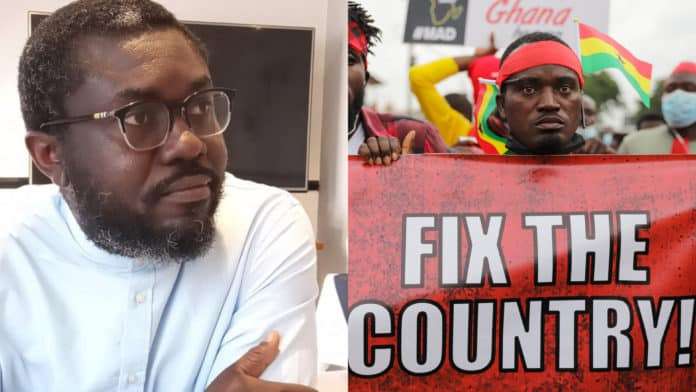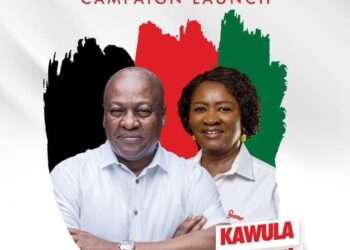The convener of the Fix the Country Movement, Mr. Mawuse Oliver Barker-Vormawor, has stated that the main objective of the movement is to solve problems of despondency among the youth. He indicated that the movement seeks to make the youth part of the solution to Ghana’s social and economic challenges.
He stated that the advocacy of the movement is directed towards Ghanaians rather than the political leaders of the country. He maintained that the youth must find a way to regain their faith that the country can change for the better. He argued that without a sense of belief, the process of rebuilding the country into the desired dream is impossible.
“A lot more young people have to believe that this country can, in fact, be able to achieve justice for them, that they might be able to see their dreams actualized in this Republic. That process we have lost and that’s what a lot of this [Fix the Country Movement] is about I think”.
Mr. Mawuse Oliver Barker-Vormawor
Mr. Barker-Vormawor stated that Ghanaians had hope of not returning to old and undemocratic practices of politics when the 1992 Constitution was instituted. He indicated that the citizens had hope of the ‘Vision 2020’ being realized and the failure of the political elites to actualize the objectives of the ‘Vision 2020’ has left a lot of citizens in a dysfunctional system.
Furthermore, the convener of the Fix the Country Movement noted the possibility of self-actualization is extremely low in Ghana. He stated that a lot of Ghanaians cannot secure a job for themselves and do not have the opportunity to grow themselves.
He argued that there is no sense of justice for the ordinary Ghanaian and no real accountability for many excessive political happenings in the country over the years.
“Obviously, people give up. So in so many types of situations even if justice has occurred, people want to have a ‘touch and go’ relationship. If I was slapped and they took my phone, I just want the phone back and I don’t want to deal with it because I don’t truly believe that justice can occur”.
Mr. Mawuse Oliver Barker-Vormawor
Moreover, he indicated that Ghana’s justice system is not fashioned toward restoring the faith of its citizens. He noted the general perception of Ghanaians concerning public leaders and how the laws of the country are applied to them is that public leaders get away with many things including corruption. “If there is a sense that there is real accountability and transparency that people actually pay for wrongs they do, that feeling will transcend across how we deal in the public space” he stated.
Mr. Barker-Vormawor also stated that compared to other countries, Ghana is a relatively young republic. He noted that so far as the people of Ghana still believe that situations can change, the country can make progress in changing its developmental trajectory.
Politics And The Rule Of Law
Regarding the rule of law in the country, Mr. Barker-Vormawor indicated that the lack of rule and law in the country is a result of the general apathy that Ghanaians exhibit on issues concerning the law. He stated that Ghanaians have lost faith in the rule of law as they have allowed politicians and public leaders to get away with bad leadership and disrespect for the country and its citizens. “We always say that power conceives nothing without demand; we have to make the demands, we have to knock on those doors,” he opined.
Also, Mr. Barker-Vormawor argued that power forces in the country’s political domain make ‘scapegoats’ of people who attempt to demand for accountability from public leaders. He indicated that the cost of standing up to leadership is high, however it is important to create changes that will be beneficial to the next generation of youth in the country. “Some of the things we are doing now, we wouldn’t do them if our fathers before us, had done these struggles, had pushed back against the system” he stated.
He stated that the current generation of youth has the responsibility of making the country a better one for the future generation. He indicated apathy is not the right approach to solving problems as time alone does not detect change but action does.
As Ghana looks forward to marking its 67th independence this month, March, political discourses are heavily focused on the country’s progress in close to seven decades. Most important in these dialogs are matters of development, the rule of law, and political participation. While Ghanaians are generally apathetic to politically-infused dialogs, it is certainly progress to witness more and more youth contributing their quota to these conversations.
READ ALSO: Governments To Discontinue Blowing Their Horns – Prof. Gyampo





















